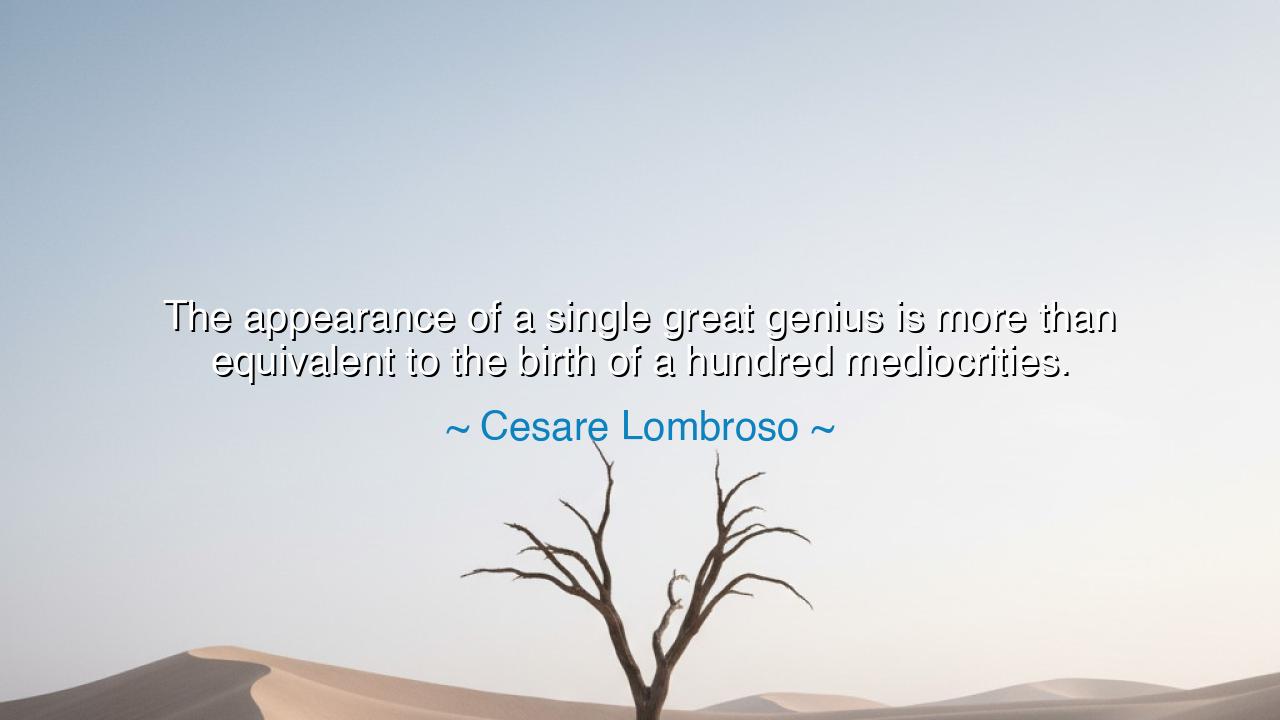
The appearance of a single great genius is more than equivalent
The appearance of a single great genius is more than equivalent to the birth of a hundred mediocrities.






“The appearance of a single great genius is more than equivalent to the birth of a hundred mediocrities.” So spoke Cesare Lombroso, the Italian thinker who sought to understand the mysterious balance between nature, talent, and destiny. His words rise like a flame against the dim fog of conformity, illuminating the eternal truth that while the many sustain the world, it is the rare spark of genius that changes its course. Lombroso, who lived in the nineteenth century, observed that history itself is shaped not by the countless who follow paths already made, but by the few who dare to create new ones—the inventors, artists, prophets, and dreamers who defy the boundaries of their age.
To understand his meaning, one must first grasp the contrast between genius and mediocrity. The mediocre live within the comfort of the known; they are the guardians of order, the stewards of habit. Their lives are steady, their works repetitive, their thoughts bound by what has already been proven. Yet the genius, like a lightning bolt in a quiet sky, splits the darkness and alters the horizon forever. The birth of such a soul is an event that reshapes the destiny of nations, for where the multitude maintains the world, the genius transforms it. The former preserve what is; the latter gives birth to what will be.
Think of Leonardo da Vinci, that child of no noble lineage, whose curiosity transcended the boundaries of human imagination. From his mind flowed visions centuries ahead of his time—flying machines, human anatomy, weapons of war, and paintings that seemed to breathe divine truth. His single life, luminous and strange, changed art, science, and philosophy in ways that no multitude of ordinary minds could. Where a hundred men may have built walls, Leonardo built wings. This is the power Lombroso spoke of—the immeasurable weight of genius, the sacred fire that burns once but lights centuries.
Throughout history, the arrival of a true genius has always been an act of divine disturbance. When Isaac Newton watched an apple fall, he saw what millions had seen before, yet understood what none had comprehended. In that single vision, he unlocked the laws that govern both the heavens and the earth. And when Marie Curie entered her humble laboratory, she carried not the pride of prestige but the quiet ferocity of discovery; her brilliance opened doors into the unseen world of atoms and energy, transforming science and healing forever. Their lives prove that a single inspired mind can outweigh the dull conformity of entire generations.
Yet there is a cost to such greatness. For the genius walks alone. He is rarely understood by his age; often ridiculed, envied, or condemned. Socrates drank the hemlock, Galileo was silenced, Van Gogh died unknown and penniless. But though the world rejected them, time bowed before them. Their suffering became the seed from which the future grew. In this, Lombroso’s words carry not only admiration but warning: genius is sacred, and to stifle it is to cripple the soul of humanity. The world that mocks its visionaries slowly blinds itself.
But we must not mistake his wisdom as a call to worship a few and despise the many. Rather, it is a summons to seek the genius within ourselves, to resist the mediocrity that slumbers in comfort and fear. Not all are destined to be Newton or Da Vinci, but each heart can awaken a spark of brilliance if it dares to think, to dream, and to act with courage. The difference between greatness and mediocrity lies not in birth, but in the refusal to remain ordinary.
Therefore, O seeker of truth, let this be the lesson passed down: cherish the rare minds that see beyond the horizon, but do not wait for them—be one. When you think, think deeply; when you work, work creatively; when you love, love greatly. Challenge what is accepted, question what is assumed, and pursue what is unseen. The world does not need more of the same—it needs the one who will rise above sameness. For it is as Lombroso said: one genius outweighs a hundred mediocrities, not because he is greater by birth, but because he dares to see the divine pattern hidden within the ordinary.
And if you, in your time, awaken even a glimmer of that genius within you—if you kindle the light that no darkness can extinguish—then your life, too, will count among the few that lifted the world.






AAdministratorAdministrator
Welcome, honored guests. Please leave a comment, we will respond soon